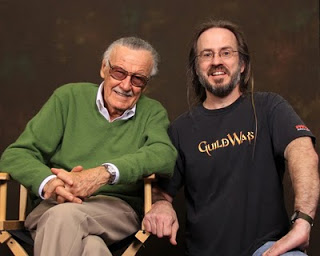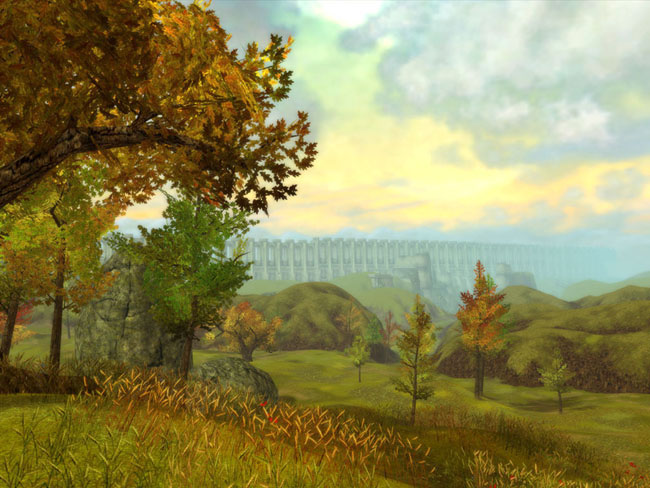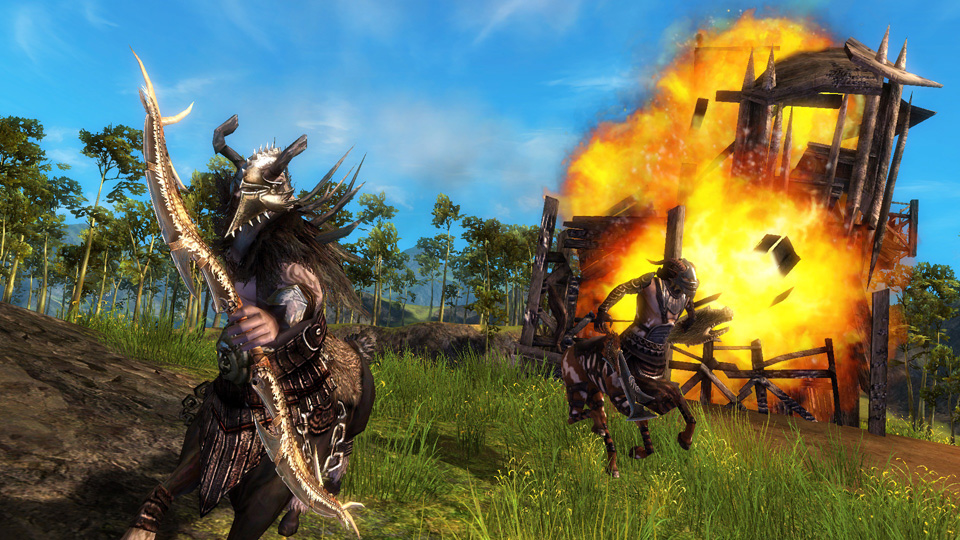 Today we interview Shawn Sharp, Art Producer at ArenaNet and one of the Gurus behind Guild Wars and Guild Wars 2.
Today we interview Shawn Sharp, Art Producer at ArenaNet and one of the Gurus behind Guild Wars and Guild Wars 2.
Manuel: Tell us something about your career, Shawn, how did you arrive at ArenaNet?
Shawn: Originally I started out as a graphic designer and illustrator working in advertising for the most part. I was also doing illustrations for pen and paper role playing game companies on the side. Dynamix, at the time a small start up computer game company in Eugene, Oregon contacted me to see if I would be interested in moving there to art direct computer games. This was in 1989, I had just started a graphic design studio and frankly didn’t even really know what computer games were. While it looked interesting I passed on the opportunity. A year later they contacted me again, I was a little more savvy and decided to give it a shot. I loved the idea of interactive story-telling and still do.
After 13 years of art directing at a couple of companies as well as free-lancing as a concept and story board artist I was looking for a move back to the Pacific Northwest and came across a small start up in Seattle named ArenaNet. I was a huge fan of the games the three founders had been involved in at Blizzard and decided to check them out. As soon as I walked in for the interview they sat me down in a room and told me to draw a monster. I was sold. I wasn’t actually applying for a concepting position and so decided right then I would take the job if they offered.
Let me explain why. Over the years with art development tools becoming ever increasingly complex there’s been an understandable emphasis put on technical as opposed to artistic abilities. Sort of “Do you know which buttons to push” instead of “Do you understand how to tell a story with those buttons”. This is over simplifying it I realize, but, the point is that Anet was less concerned with technical prowess than with artistic prowess. Less with “Can you model an Ettin?” than with “Do you know what an Ettin is?”
So anyhow, once I had the job it evolved quite a bit as the company grew from 25 to close to 200. I started out primarily concepting for our first title. As such I was the primary liaison with the design department. Eventually the sheer volume of work we were producing and the number of people involved necessitate I make the art pipeline my primary focus and was asked to take on the position of art producer. That was seven years and five titles ago.
Manuel: Making Video Games was something you always wanted to do? (and you made it very well!)
Shawn: No, it really wasn’t. As I mentioned above I turned the job down at first. Of course growing up on a farm in the 60’s and 70’s for all intents and purposes there were no computer games per se. At least not that I was aware of. I played arcade games from time to time but it never occurred to me to make them.
 Manuel: Guild Wars has been an impressive innovation in MMORPGs, can you tell us about these innovative components?
Manuel: Guild Wars has been an impressive innovation in MMORPGs, can you tell us about these innovative components?
Shawn: Well, technically, strictly speaking, GW isn’t really an MMORPG in the traditional sense. I point this out both to describe what I feel were some fantastic innovations as well as to segue into the next question about GW2. Obviously one of the biggest innovations we introduced with Prophesies – the first Guild Wars campaign – was no subscription fee. This was actually a big issue for me. I’ve played a lot of MMOs of course and one of the things I keep coming back to is asking myself if I feel like I’m getting 15 dollars of new content each month or if playing with other people on line is worth the money to me. I suppose lot of people ask themselves that.
I would also say with our instancing system we avoided a lot of the grieving problems that turn so many people off from traditional MMORPGs while still allowing a fantastic PVP experience. Guild Wars has always been about cooperative play. For instance you don’t have to worry about other players stealing your kills, spawn camping and so on. With GW2 we build on that.
 Manuel: Guild Wars 2 will be even more innovative! What about it?
Manuel: Guild Wars 2 will be even more innovative! What about it?
Shawn: The reason I held off on this interview for a while was that I wanted to wait until we were ready to start talking about some of the GW2 features. We’ve recently posted some interviews on our site outlining just some of the really cool things we have in the works for GW2.
 While Guild Wars 2 will definitely be an MMORPG I honestly believe we’re reinventing the genre. Not only will it offer a rich and rewarding multiplayer experience but single player as well. For the more mission and quest oriented players there’s tons of directed play and our scaling event system creates a living world in which there’s always things going on and you can get involved regardless how many other people are there at the time. Our side-kicking system lets you play with friends regardless of level disparity or what race you decided to play.
While Guild Wars 2 will definitely be an MMORPG I honestly believe we’re reinventing the genre. Not only will it offer a rich and rewarding multiplayer experience but single player as well. For the more mission and quest oriented players there’s tons of directed play and our scaling event system creates a living world in which there’s always things going on and you can get involved regardless how many other people are there at the time. Our side-kicking system lets you play with friends regardless of level disparity or what race you decided to play.
Obviously there’s a ton of things I can’t talk about yet but check out our site and you’ll get an idea of why, as a gamer, I’m so excited about GW2.
Manuel: Why videogames in actual industry are not so innovative? Seems that developers and publishers do not want to risk very much.
Shawn: I would say there’s no end to innovative ideas and creative people in the industry but certainly the risk issue is a big factor in some cases. Considering the amount of money it takes to get some of the larger titles to market companies can be understandably nervous about investing in an unproven idea. Depending on the type of game, platform and whether you’re a development or publisher there may also be a large number of other people that need to be convinced to take what could be a fairly expensive chance on an unproven idea.
We’ve certainly had times where we’ve said to ourselves, “Wow, this is pretty different; I hope people buy into it” but we’ve had advantages supporting innovative that a lot of companies don’t. For one thing NCSoft has always been incredibly supportive of us. I can’t overstate how important that has been. We also have some of the most experienced and talented people in the business so not only do we have a pretty good idea of what’s going to excite the audience. In fact, we ARE the audience so that helps a lot. But, speaking of the audience, one huge advantage we’ve had over the years is really listening to player feedback. Even years before we shipped Prophesies we had the game live and a really active alpha player base. We’d do a build, play it, get response and make changes. Sometimes we would make small changes and sometimes totally toss an idea and start from scratch.
Manuel: How do you see the future of MMORPGs?
Shawn: I would expect to see them continue to branch out in terms of broad audience appeal and become much more a part of mainstream gaming. While most are pretty solidly fantasy based at the moment I also expect to see a greater range of settings and style of game play.
Manuel: I absolutely believe that VideoGames are important Forms of Art, but many do not think so. What can we say to them?
Shawn: This subject has gotten a lot of attention recently due in some part to comments made by Roger Ebert. It’s possible that, due to the similarity in budgets between movies and games in some cases and the fact that there’s a certain amount of cross over in talent that there’s an expectation they should compete on the same level. I wouldn’t agree with this nor say one is a more legitimate form of art City Scars - Graffiti and Fight For Urban Beauty - It is widely acknowledged that art is highly subjective and truly lies in the eye of the beholder. Often, differences of opinion merely reveal individual preferences, and it is generally agreed that these personal tastes should not override the freedom granted to the artist and their work. However, the issue of graffiti is one of… . They are, as the saying goes, apples and oranges. While they are both telling stories to a greater or lesser degree, with the exception of color and sound, movie making as an art form has not changes substantially in the past 100 years. Games change and evolve constantly, vary greatly by genre and culture, are interactive and often non-linear. While many of those same things can be said of film-making certainly not to the degree of games. To suggest they are not “art” per se would be similar to a fiction writer denouncing sculpture for not being art; a painter saying the same of theater etc. It’s all art.
I feel it’s safe to say that not only will games themselves continue to be accepted as mainstream entertainment but that what we think of as games – interactive entertainment – will continue to evolve and become more and more a part of our concept of art, entertainment and education.
Manuel: Last but not least, Videogames as social communication. Multiplayer games and MMORPGs are creating a wonderful network of new communication opportunities between players. Playing with people from anywhere in the world definitely opens minds and leads to world integration. Your ideas?
Shawn: I absolutely agree and believe it will continue to grow and evolve. Due to the internet The World-wide-web Niche - The global economy has been severely impacted. Millions of people have lost their jobs, many are losing their homes, and retirement portfolios are disappearing at an alarming rate. What happens in the World Wide Web? We often discuss the global financial tsunami, an economic crisis on a scale that rivals the Great Depression of the… the idea of interacting with people across the planet is pretty common place anymore but games give you a common goal, a shared experience and can, ideally, compel a cooperation that may not naturally exist. “We need to team up to defeat the dragon”.
That said, there are downsides as well. Anonymity can also invite negative behavior. Some people do and say things on line they would never say or do to a person face-to-face. Clearly this will always be a part of on-line interaction whether in games or elsewhere.
But I suspect it will to some degree weed itself out. Just as real world social behavior evolves to benefit society – laws, codes of conduct, social mores – so too will those of the virtual worlds. Players in these on-line worlds will become less tolerant of negative behaviors and developers will respond accordingly to appease their customer base. People who persevere in spite of these efforts will find themselves alienated. Much like the real world. But, much like the real world we’ll never be entirely free of griefers.
Another aspect of on-line society I feel has a positive and negative potential is the one-world society. As much of a proponent as I am of virtual and expansive on-line communities there is always a danger of it replacing local and face-to-face interactions. It’s critical for our social evolution to interact with people around the world. The more you know of that family on the other side of the world the more understanding you are of their ways and culture.
But, the family on the other side of the fence in your own neighborhood is the one that will protect your house when you’re away, will babysit your kids and have dinner with you. It’s important to cultivate both.
Manuel Marino is a seasoned Senior Producer, Music Composer, and Artist with over a decade of experience. He specializes in branded entertainment across various mediums, including video games, films, and advertising campaigns. With 20+ years as a game music composer, Manuel has worked on numerous platforms, creating diverse orchestral soundtracks. HIRE ME


 Manuel is a passionate, driven, and techsavvy AV technician,
Manuel is a passionate, driven, and techsavvy AV technician, 










Great interview! =0)
Many thanks 🙂 yes, it’s also one of the most famous articles at ManuelMarino.com